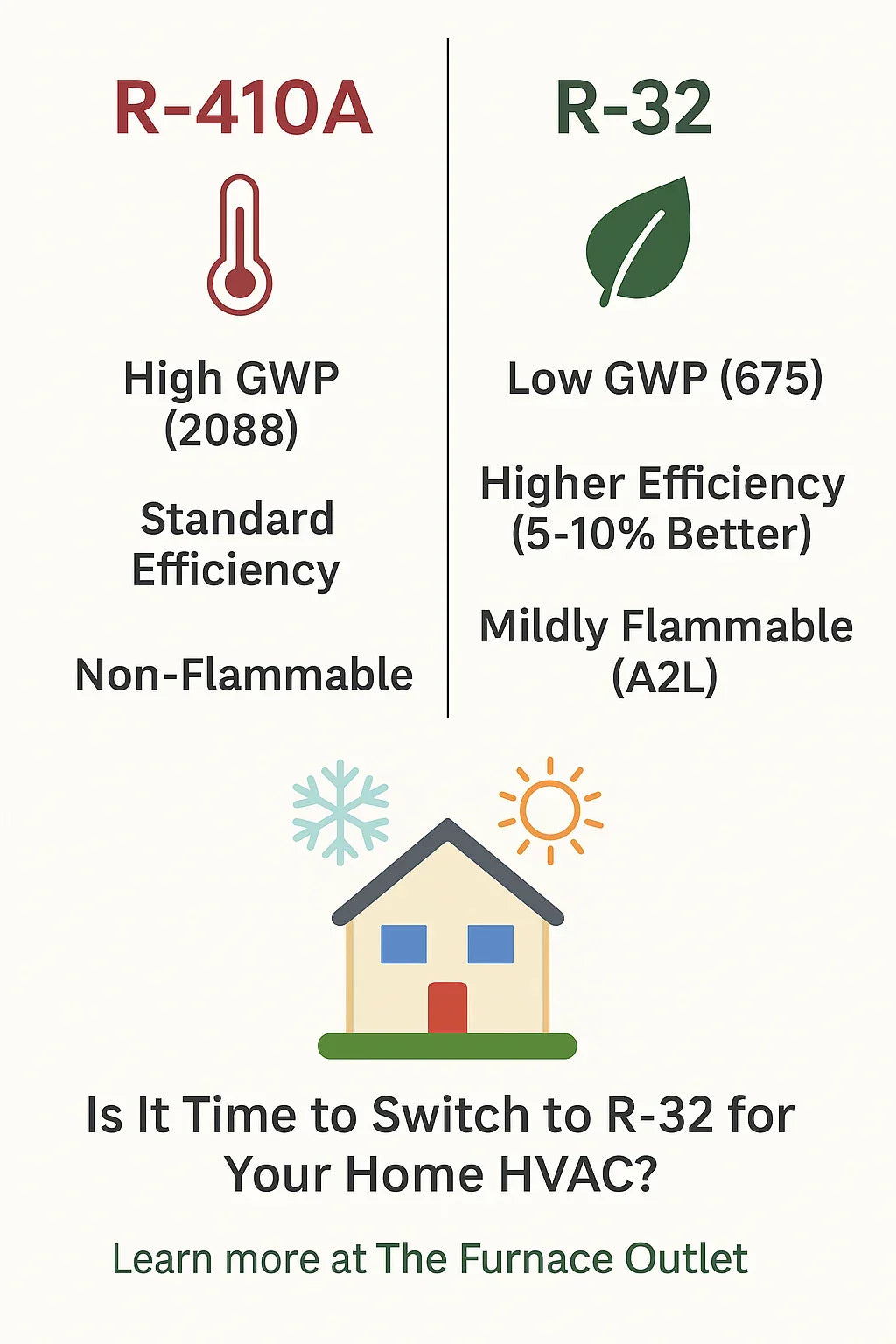📌 Introduction
As regulations tighten and technology advances, many homeowners like Mark Callahan are asking:
“What does switching from R-410A to R-32 really mean for my next HVAC system?”
This guide will break down:
-
What R-32 and R-410A refrigerants are
-
Efficiency, environmental, and safety comparisons
-
Availability and servicing considerations
-
Regulatory reasons behind the phasedown
-
Real-world homeowner impacts on costs and maintenance
-
Brand adoption and market readiness
By the end, you will know whether R-32 is the right refrigerant for your next HVAC investment, aligning your choice with comfort, cost savings, and environmental responsibility.
🧊 What Are R-410A and R-32 Refrigerants?
R-410A:
-
Blend of R-32 and R-125.
-
Used widely in residential AC systems since the R-22 phaseout.
-
Zero ozone depletion potential but high Global Warming Potential (GWP) ~2,088.
R-32:
-
Pure refrigerant, also part of R-410A’s blend.
-
GWP of 675 (approximately 67% lower than R-410A).
-
Slightly higher efficiency due to better thermodynamic properties.
-
Mildly flammable (classified as A2L under ASHRAE standards).
Learn more via Chemours’ refrigerant education center. ✅
🌎 Why Is the Switch Happening?
The switch to lower-GWP refrigerants is driven by:
-
EPA AIM Act compliance: Gradual phasedown of high-GWP HFCs.
-
Kigali Amendment alignment: Global efforts to limit greenhouse gas emissions.
-
Consumer demand for sustainable HVAC solutions.
The EPA’s HFC phasedown timeline shows gradual reductions, encouraging manufacturers to adopt R-32 for compliance. ✅
Bottom Line: R-32 aligns with regulatory goals while maintaining performance in your HVAC system.
⚡ Efficiency Comparison: R-32 vs. R-410A
R-32: ✅ Better heat transfer efficiency. ✅ Lower refrigerant charge needed (~20% less). ✅ Higher system capacity at the same energy input. ✅ Compatible with inverter-driven compressors, improving SEER2 ratings.
Example:
-
An R-32 system may achieve 5-10% higher efficiency over a similar R-410A system under the same conditions.
For deeper technical comparisons, check out Daikin’s R-32 data and testing results. ✅
♻️ Environmental Impact
R-410A:
-
GWP: 2,088
-
No ozone depletion
-
Large environmental footprint under greenhouse gas calculations.
R-32:
-
GWP: 675 (about one-third of R-410A)
-
No ozone depletion
-
Easier recovery and reuse due to its single-component nature.
Using R-32 in your HVAC system can reduce your environmental impact significantly over the unit’s lifespan.
Explore refrigerant GWP impacts at the IPCC’s Refrigerant GWP Database. ✅
🔒 Safety Considerations
Flammability:
-
R-32 is mildly flammable (A2L); R-410A is non-flammable (A1).
-
HVAC systems are designed to contain refrigerants securely.
-
Installations require adherence to updated codes for refrigerant handling.
ASHRAE guidelines outline safe practices for A2L refrigerant systems. ✅
For homeowners: As long as your system is installed by licensed professionals, R-32 systems are safe for residential applications.
🛠️ Availability and Servicing
Availability:
-
R-32 systems are increasingly available in the U.S. market, with major brands adopting R-32 in their new product lines.
-
R-410A systems are still widely available but will phase out over time.
Servicing:
-
Technicians require updated certifications for handling A2L refrigerants.
-
Lower refrigerant charge reduces material costs for repairs.
-
Leak detection is easier due to R-32’s single-component nature.
For HVAC technician training updates, see HVACR Career Connect. ✅
💰 Cost Differences: R-32 vs. R-410A Systems
| Feature | R-410A | R-32 |
|---|---|---|
| Refrigerant Cost | Higher | Lower |
| Efficiency | Standard | Higher (5–10%) |
| GWP | 2,088 | 675 |
| Charge Amount | Higher | Lower (~20% less) |
| Servicing Costs | Standard | Slightly lower long-term |
Upfront costs:
-
Similar for equipment, though some R-32 systems may carry a slight premium during the transitional phase.
-
Rebates and incentives are increasingly available for R-32 systems.
Check incentives in your state using DSIRE’s rebate database. ✅
🏠 Real-World Homeowner Impacts
✅ Lower Energy Bills: Higher efficiency can reduce your monthly costs.
✅ Future Compliance: Avoids issues as R-410A phasedown limits supply.
✅ Lower Environmental Impact: Reduced GWP aligns with sustainable home goals.
✅ Compatibility: Many R-32 systems fit existing ducted and ductless setups with minimal modifications.
✅ Noise & Comfort: R-32 systems often pair with inverter technology, improving variable speed performance for quieter, consistent comfort.
🔄 Brand Adoption and Market Readiness
Major brands adopting R-32 in their residential lines include:
-
Daikin
-
Mitsubishi
-
LG
-
Carrier (in select regions)
These manufacturers are expanding their R-32 offerings as U.S. regulations progress, ensuring parts and servicing availability.
Learn more about these brands’ adoption timelines via ACHR News. ✅
⚠️ What Homeowners Need to Consider Before Switching
✅ Is your installer certified for A2L refrigerants? ✅ Does your area’s code support R-32 installations? ✅ Does your home’s HVAC design match the system’s airflow requirements? ✅ Do you qualify for efficiency incentives with R-32?
Answering these questions will help ensure a smooth transition.
🚀 Summary: Should You Choose R-32 for Your Next HVAC System?
✅ Yes, if you want:
-
Higher energy efficiency.
-
Lower environmental impact.
-
Compliance with upcoming refrigerant regulations.
-
Modern inverter-equipped systems for quieter, precise comfort.
✅ Wait or reconsider if:
-
Your installer is not yet certified for A2L refrigerants.
-
Local codes are not updated to accept R-32 installations.
📌 Next Steps
1️⃣ Check if your local HVAC contractor installs R-32 systems.
2️⃣ Review your state’s incentives on DSIRE. ✅
3️⃣ Explore current R-32 system offerings on The Furnace Outlet. ✅
4️⃣ Schedule a professional HVAC consultation to evaluate your home’s suitability.
5️⃣ Plan your upgrade timeline to align with rebates and regulatory changes.
By making the switch to R-32, you prepare your home for a more efficient, environmentally responsible future while keeping your family comfortable year-round.
In the next topic we will know more about: Installing a 3.5 Ton R-32 AC & Gas Furnace: What Homeowners Need to Know







